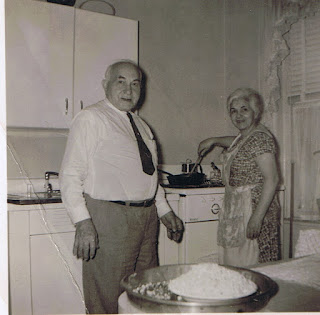A Clean Kitchen
When I was teaching my daughter to cook, I asked her what the first step in any meal-making should be.
She guessed, “Sauté garlic in some olive oil?” A logical guess in my case since all my recipes start this way.
“No,” I said, “First, start with a clean kitchen.”
Both my grandmothers gave me this advice. Before beginning any meal preparation, clear the counters, wash any dirty dishes, and sanitize all surfaces. Only then are you ready to gather ingredients and begin.
This is sage advice in more than one way. Before starting any project, it is best to clean up your work space. Clear your desk, plan your project, gather your tools and materials and begin.
This advice also applies when considering new ideas. Clear your mind of preconceived notions, old prejudices, outdated information and nonsense. Forget what the pundits say! Collect data, analyze it, and draw your own conclusions. Use good judgement – like your grandmothers taught you (If everyone jumped in the lake, would you too?). Think for yourself.
In today’s world, there are plenty of people trying to tell us what to think. Some say, “Why should I think? I just let (fill in a favorite pundit) tell me what the truth is.”
Shivers run down my spine! Are these folks really ready to put their trust and future in people who are working for ratings or trying to sell books or merely entertaining the masses? Even if they are experts or authorities or “in the know,” shouldn’t we at least investigate counter-arguments and examine different points of view?
Today there are many hot-button issues. Do you believe in climate change? How do you feel about the refugee question? What about immigrants? Are some religions better than others? How should we rear our children? Are our schools failing or succeeding? Is the old way the best way? Is my way better than yours?
Decisions should only be made after clearing your mind, considering all available evidence, sifting it through our own good judgment, and making careful choices. Clear the counters, wash the dirty dishes, sanitize all surfaces, and then begin.
My grandmothers gave me another sage piece of kitchen advice: The kitchen isn’t clean until you wipe off the table and sweep the floor. Clean the kitchen, cook the meal, enjoy it, clear away, and then finish up by leaving the kitchen clean for the next meal. You’ll sleep better knowing that the job was well done.
Clear you mind, consider new ideas and savor them. Then clear space for new ideas unsullied by scraps left behind as you prepare for the next idea. You’ll sleep better knowing that you’ve done the job well.
A few more words of wisdom: After clearing the kitchen or your mind, share what you’ve learned with your grandchildren. Grandparents and grandchildren work well together – just like garlic and olive oil.

